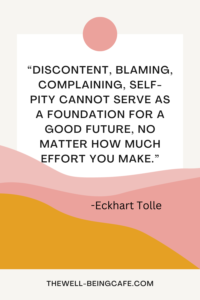Today I’m sharing a concept that has completely changed my life for the better, and without it, I wouldn’t be the person I am today. This concept is known as the ‘victim mindset’, and I’m going to explain in this article what it is, how it works, why it’s ruining your life, and what I did to fix it in myself.
A victim mindset is the number one reason why people are stuck in their lives and struggling to make important changes! So, if this sounds like something you might be struggling with, go and get yourself a cup of tea and keep reading!

When I was around 16 years old, I developed quite severe mental health struggles like depression, anxiety and psychosis. Over the course of a year, I started to neglect my school work and began to isolate myself, which led to the loss of all my close friendships. As I was attending boarding school at the time, my family and I made the decision for me to move back home and attend the local school in the new school year. Not long after, my long-term relationship ended which completely devastated me.
At this point in my life, I had never felt more sorry for myself. I believed that all this had happened to me because I was unfortunate enough to be ‘given’ this mental ill health and that it was all out of my control. I had lost almost everything and now I felt I had no way of fixing it. I had gained some weight from my psychiatric medications and felt miserable about myself. However, I continued to do nothing and repeated the same unhelpful behaviours as I had done before.
A month or so later, I was still feeling helpless. My dad saw me crying one day and decided to speak to me about it. In this conversation, he said:
“All of these things have happened now, so, what are you going to do about it?”.
At first, this made me angry because this sounded like a harsh thing to say and I just wanted his compassion. However, after this, I began to realise that this was the only way I was going to dig myself out of this hole and start to feel happy again. I was the one who had to do something about it, and no one else could do it for me.
What Is A Victim Mindset?
Someone with a victim mindset believes they’re powerless and that life is happening to them rather than for them. They tend to blame other people for their problems and take no responsibility for their own happiness.
Usually, when we use the word ‘victim’, we’re referring to someone who’s had something terrible happen to them that was completely out of their control, and now they’re forced to live with the consequences. This is how a victim mindset can make someone feel about their whole life.
This mindset causes people to really believe that they’re stuck and that there’s nothing they can do about it. This kind of thinking also creates a self-fulfilling prophecy, which further reinforces this unhelpful belief.
For example, if someone with a victim mindset really wanted to exercise more but was struggling to make this a consistent habit, they might conclude that it’s because they don’t have enough time, or because they’re not naturally athletic, and then give up on their goal due to their ‘circumstances’. However, if they realised that they were in control of their own lives, they would make the time to exercise by prioritising it in their day, and they might aim to become athletic by improving their physical fitness.

![]()
![]()
Where does a victim mindset come from?
It’s important to mention that, people with victim mindsets are not really to blame for this. The worst thing about thinking like a victim is that you don’t actually know you’re doing it. This is how you’ve always seen the world and if no one points this out to you, how can you ever know there’s another way to live? It’s unfortunately a very common problem, but it’s not a sign of weakness. It just means that you don’t know any better.
However, once you start to notice yourself thinking this way, it is going to take a lot of effort and hard work to start to change it. Trying to catch yourself thinking like a victim and then challenging these thoughts isn’t easy work, but it will be so worth it once you start to break the habit.
Recognising the Victim Mindset
Recognizing a victim mindset within yourself can be a challenging process, as it often operates at a subconscious level. Here are some common signs that may indicate you have adopted a victim mindset:
- Blaming Others: You frequently blame others for your problems and difficulties rather than taking responsibility for your choices and actions.
- Negativity: You have a pessimistic outlook and often focus on the negative aspects of situations, even when positive elements exist.
- Self-Pity: You frequently feel sorry for yourself and believe that you are the only one facing such hardships.
- Inaction: You avoid taking initiative or making necessary changes in your life because you believe external circumstances will never improve.
- Dependency: You rely on others to solve your problems, provide emotional support, or make decisions for you.
![]()

Breaking Free from the Victim Mindset
If you’ve identified a victim mindset within yourself, take heart – it is possible to break free from this limiting perspective. Here are some steps to help you shift your mindset and regain control over your life:
- Self-Awareness: The first step in overcoming a victim mindset is recognizing it. Self-awareness is key to understanding your thought patterns and behaviours.
- Ownership: Take responsibility for your life and choices. Acknowledge that while external factors may contribute to challenges, you have the power to make decisions that can lead to positive change.
- Challenge Negative Thoughts: Begin to challenge and reframe negative thoughts. Instead of dwelling on problems, focus on solutions and possibilities.
- Set Goals: Define clear goals and objectives for yourself. Having a sense of purpose and direction can empower you to take action.
- Build Resilience: Learn to bounce back from setbacks and adversity. Resilience is a valuable skill that can help you navigate life’s challenges with greater ease.
- Seek Support: Surround yourself with a supportive network of friends, family, or a therapist who can provide guidance and encouragement as you work to change your mindset.
- Practice Gratitude: Cultivate a gratitude practice to shift your focus toward the positive aspects of your life. Regularly acknowledge the things you’re thankful for.
- Embrace Empowerment: Recognize your own agency and the capacity to shape your own destiny. You have the ability to create a better future for yourself.
Start Taking Responsibility For Your Life
This is the key mindset shift I want you to take away from this article. You are responsible for everything in your life.
By this, I don’t necessarily mean you’re to blame for everything that happens to you. I’m saying that you can always choose how to respond. For example, it may not be your fault that you were born into a dysfunctional family or that you are dealing with an illness, but it’s your choice to feel and behave the way you do about it.
It may be true that other people have better life circumstances than you, but that’s not a reason to believe you can’t achieve everything that they have. You might need to put in extra time and effort, and although that may not seem fair, the alternative is to do nothing.
Whatever problems you want to overcome in your life, you can either find a way to overcome them, or if not, you can change the way you feel about them.
For example, if your goal was to start a business or find your ideal relationship, you could simply decide to do whatever it takes to make that happen. I know this may sound a bit simplistic, but this is a mindset you can adopt that will give you full responsibility for your goal. You can read books, take courses, do research, speak to people who have done it before, and use infinite trial and error until you get there.
Once you accept this to be true, you realise everything that happens in your life is in your own hands. This can feel scary at first, because now you’re the one who needs to put in all this work, and there’s nothing you can blame for your failures but yourself. It’s out of most people’s comfort zones and it’s simply easier to tell yourself that it’s not possible for you. However, believing that you are in control can also be incredibly inspiring and motivating.
After I realised I could take responsibility all those years ago, that’s when things finally started to change. I decided to set some goals for myself with the belief that no one could achieve them for me and that no life circumstance was a good enough excuse that I couldn’t get there.
Now, almost 8 years later, I’ve turned my life around completely. My mental health is great, I’m disciplined in the important areas of my life, I’ve made some amazing new friends, and also reconnected with old ones, and this year I married my boyfriend from all those years ago.
So now that you know you’re thinking like a victim, there’s no going back! You need to start taking responsibility for your thoughts and all the outcomes in your life. Although it feels uncomfortable and even quite harsh, it will end up being the kindest thing you ever do for yourself.
See you next week friend!

